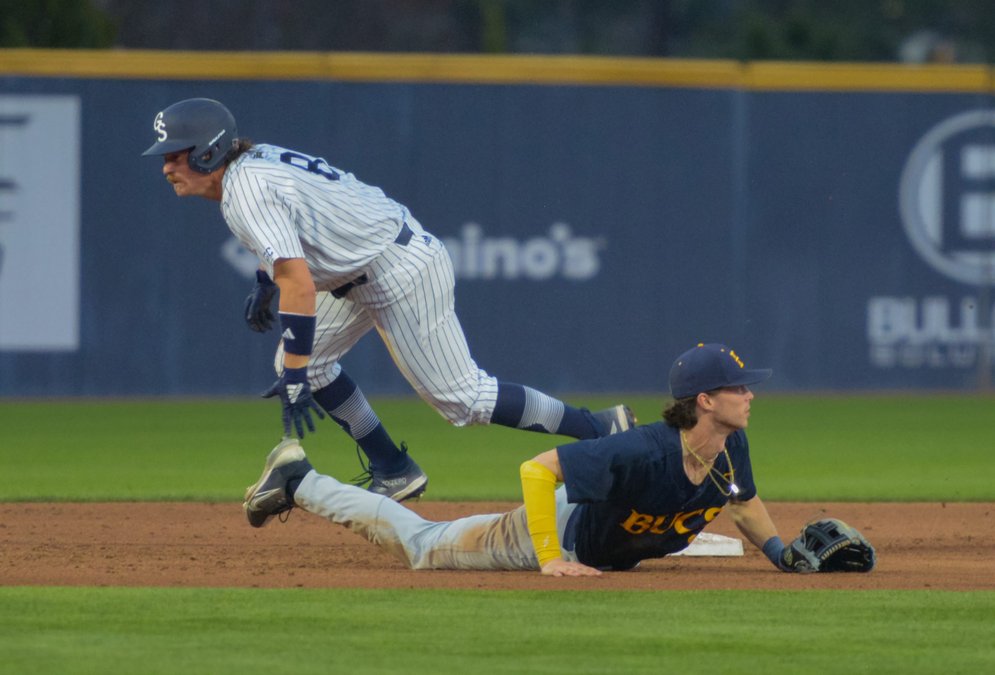The landscape in college athletics continues to change quickly. The transfer portal started in 2018 and new regulations adopted in 2021 allowed Division I student athletes to change schools without losing a year of eligibility, which had been the case in the past. 2021 also saw the landmark case of NCAA v. Alston allowing college athletes to earn compensation for their name, image and likeness.
These added challenges have forced athletic directors to create positions and hire staff to keep up with the ongoing changes.
At Georgia Southern, Director of Athletics Jared Benko has tried to stay proactive and recently the school announced the Eagle Nation Collective providing a way for donors to provide financial support for Eagle athletes.
“We want to be able to grow our fundraising and grow our operating budget,” Benko said. The best way to do that is to rely on Eagle Nation to continue to get excited about the direction we are going and get them engaged in different ways.”
Eagle Nation Collective is a Limited Liability Corporation (LLC) and is the Official Collective of Georgia Southern Athletics. It was created by 20 Eagle supporters who had a shared vision to continue to transform Georgia Southern Athletics and promote Georgia Southern’s student-athletes’ potential endorsement opportunities. The Eagle Nation Collective seeks to create a wide range of NIL opportunities for student-athletes that help them grow as young men and women while allowing supporters to interact with student-athletes in unique ways.
“Georgia Southern Athletics continues to prioritize and increase its overall support for our student-athletes, including maximizing their NIL opportunities,” Benko said. “The Eagle Nation Collective is another opportunity for our fans, donors and alumni to support our student-athletes in their NIL-related activities while at Georgia Southern and when their careers are finished. We fully support the Eagle Nation Collective.”
One thing many schools are starting to be faced with is with NIL players could conceivably be competing for donor money with the athletic and marketing departments which is something that administrators are having to deal with for the first time.
“Is there a chance that some of this takes away from funds for the Erk Russell fund, of course there is,” Benko said. “We think it will be more of a chance to bring new people into the fold. You see a lot of growth in the 25–45-year-old crowd. The 25–35-year-old crowd can sometimes be tough to break through for donations. This would allow them to stay involved in a more affordable way. We hope then to transition some of those 25-35 from the NIL giving to potentially more of the giving for something like the Erk Russell fund, or both.”
Breaking it down even more, Benko says there are four major buckets in which athletics distributes its money.
“You have a facilities bucket, you have a competitive excellence bucket, and an ad-hoc bucket,” Benko explains. “Facilities is self-explanatory. The competitive excellence allows us to recruit and retain our top coaches and staff. The ad-hoc bucket is sports specific donations, our APEX program and study abroad programs and such. The fourth bucket allows us to go out and fundraise and share information on the collective as well as in how to support out student athletes.”
In regards to the transfer portal coaches are having to decide on whether to take a chance on an incoming freshman straight out of high school, or possibly go into the transfer portal and get a little more seasoned player who may make a quicker transition. The transfer portal isn’t going away anytime soon, but recently the NCAA announced that the they may cut back the time in which student athletes may transfer from 60 days to 30 days.
“The portal taketh and giveth, but I feel it has helped us more here at Georgia Southern,” Benko said. “I feel like our coaches have been advantageous and aggressive in the portal. We are always going to recruit Georgia and high school student athletes, but I think it is incumbent upon each coach to look at their roster and decide where can we can we get better and sometimes the transfer portal is the best way to do that.”





